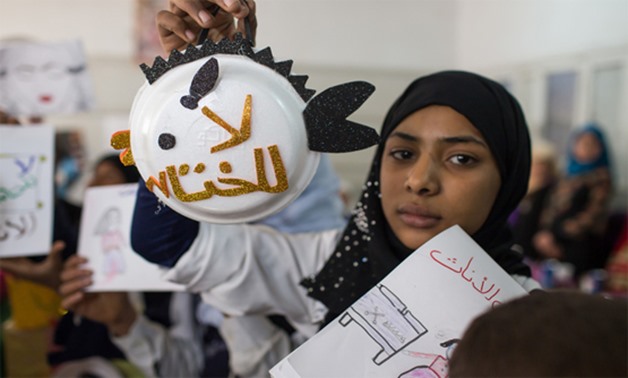
A girl calls for putting an end to FGM- photo courtesy of UNFPA
CAIRO – 10 June 2017: The Ministry of Health is planning to launch a campaign aiming to raise the awareness of freshly-graduated doctors, nurses and pharmacists on the negative long-lasting effects of Female Genital Mutilation (FGM), Dr. Ali Mahrous, head of the ministry’s Free Treatment Sector, told Egypt Today on Saturday.
The campaign will include informational material on the effects of FGM, which will be distributed in public and private clinics and hospitals. The materials will also shed light on the legal penalties of performing FGM, which is illegal under Egyptian law, Mahrous said. He added that 85 percent of FGM operations are carried out by doctors and nurses.
Earlier in May, the directors of the obstetrics and gynecology departments of all Egyptian universities announced that a curriculum on FGM will be developed and taught in all medical departments beginning in 2018.
Female genital mutilation, once referred to as female circumcision, typically involves removing all or part of the clitoris. The practice is banned by several international treaties but remains a practice in some African countries, including Somalia, Sudan and Egypt. Operations are often carried out by unqualified surgeons in unsanitary conditions.
The World Health Organization (WHO) estimated that at least 200 million girls and women in 30 countries alive today have undergone FGM, which can cause lasting health problems and even lead to death.

Prevalence of FGM for women aged 15–49 year 2016_-
In August 2016, the Egyptian parliament toughened the penalties for FGM. Those who perform the operation could face seven years in prison, and 15 years if the girl dies as a result of the procedure.
According to the National Population Council, FGM rates are in decline, particularly among the 15-17 age group among which the prevalence of the practice dropped down to 61 percent in 2014 from 74 percent in 2008.
In a February press release on the occasion of the International Day of Zero Tolerance for Female Genital Multilation, the National Population Council said that it aims to “establish a strong and interactive bridge between Africa and the whole world to expedite the end of FGM by 2030,” in accordance with the U.N.’s 2030 sustainable development goals (SDGs).

Comments
Leave a Comment